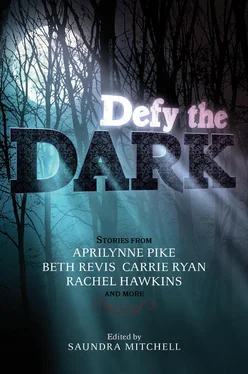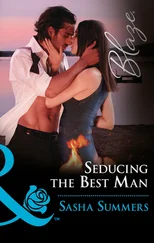“With the Young Artists’ Retreat or with my daughter?”
“Neither. It all depends on the night trolley.”
The Spanish guitarist seemed deafening in the intense silence that followed Cado’s statement.
“What do you know about the”—Patricia lowered her voice—“night trolley?”
“About a month ago I was on a hunting trip with my uncles. We thought we were about to flush a wild hog from the bushes, but it wasn’t a hog.
“At first I thought it was a naked man running wild in the woods, a maniac or something. But even as I thought it, I knew it wasn’t a man. It wasn’t human. It had sick white skin and needle-sharp teeth and a head three times as big as mine.”
Patricia said, “Big as a pumpkin?”
“Yeah!” The recognition on their faces healed something in Cado he hadn’t known was damaged. His family had half convinced him he’d been seeing things. Even his uncles who had seen the same thing he had.
“A cackler?” Mrs. Markham said to her husband. “In Charter? I’ve never heard of such a thing.”
“They get out, but they don’t last long.” Mr. Markham turned a sour eye on Cado. “Certain people aren’t as tolerant as we are.”
“That wasn’t any sort of thing I was ready to tolerate,” Cado said. “It was already dying when we flushed it out, but it was more than ready to take us all with it. I got in behind it with my hunting knife and put it down.
“My uncles buried it and said not to tell anybody. That even though it was a crazy mutant, we could all end up in jail.”
“A mutant?” the Markhams exclaimed.
“Uncle Beau said that was the only logical explanation.”
“That a man was bitten by a radioactive pumpkin and became a mutant?” said Mr. Markham. “That kind of logic?”
Patricia said, “What does any of that have to do with the night trolley?”
“Uncle Beau said that it came from here. That Portero was full of mutants. And he told this story about a friend of his who moved here. The locals started in on him, telling him he should move back where he came from, that he didn’t have what it took to live in their town. So Uncle Beau’s friend asked what was the bravest thing anybody could do. And they all said the same thing: ride the night trolley.
“They said it was a kind of ghost on wheels that only came in the dead of night, and people who rode it were never seen again. They told him that if he could survive a ride on the night trolley, every Porterene would worship him as the most hard-core badass in all creation. So Uncle Beau’s friend agreed.
“They sat with him at the stop till three a.m., and after the trolley appeared out of thin air, they watched him climb aboard. They waited all night for him to come back, but he never did.
“You Porterenes have your cacklers and your blood grackles and no fear of anything. Except this one thing. That’s the reason I came early, to do what Uncle Beau’s friend couldn’t— ride the night trolley and live to tell the tale. If I can be brave enough to do that, to experience something that even a Porterene thinks is scary, I can be brave enough to do anything. Even become a classical musician.”
At the end of Cado’s long, heartfelt recitation, Patricia and her parents laughed. They laughed until they couldn’t breathe.
But Cado was a redneck who played the flute. People would probably still be laughing at him at his own funeral.
After dinner, Cado and Patricia escaped her parents and went to Fountain Square to watch the fireworks with her friends who were all band geeks and, like Cado, played uncool instruments: the oboe, the xylophone, the piccolo. Everyone wore black, just as Patricia had claimed, but they also managed to show their patriotism with Fourth of July buttons and hats. Several people had painted the American flag on their faces.
As they sat together in an amphitheater—with a huge fountain at its center spouting red, white, and blue water—Cado noticed that the Porterenes shared an odd resemblance; but not like relations, nothing that simple. More like they had once all been held hostage together and still bore the psychic scars.
After the fireworks show, Cado and Patricia left the square and strolled past businesses still open, past people chatting under awnings and on the cathedral steps and on benches, in no hurry to be anywhere.
The night was warm, but Patricia was cool on his arm. Cado had never seen her break a sweat. The knowledge that she’d never done a hard day’s work—unlike the women in his family, who worked on a pig farm—secretly pleased him.
“Why didn’t you want to hang out with my friends?” she asked, curious instead of upset.
“It’s getting late.”
“You wanna go home?”
“No.” They went up a short flight of steps to a part of the street that held more homes than businesses and so was correspondingly quieter. “I wanna find that trolley stop.”
“That joke stopped being funny two hours ago.”
“It’s not a joke.”
Patricia stopped walking, and so Cado left her behind. He didn’t have to search for long. The stop was just a few yards down the street, bathed in the warm glow from the windows of the skinny brick homes that stood in a row behind it.
Patricia ran after him and then blocked his way. “You are not getting on that trolley.”
“Sure I am,” said Cado, lifting her out of his path. “It’ll be good for me. The kind of experience that’ll put my whole life into perspective.”
“Or kill you!”
“Either way.” He sat on the blue bench next to the brown-and-white trolley stop sign. “Death is an answer.”
“Death is a question. The ultimate question.” Patricia tugged at him but didn’t have the muscle to move him off the bench.
The more frantic she became, the calmer Cado felt, happy even. She wasn’t laughing at or pitying him now.
Patricia gave up her attempts to haul him bodily from the trolley stop and instead sat beside him. She took his face in her hands, forcing him to look at her. “Only one person ever came back. One person. Who gave birth to many, many babies. With many, many legs.”
“Obviously I’m not gonna give birth to anything,” said Cado, amused.
“It was a guy who came back,” Patricia said, stabbing Cado’s amusement in the back. “And his babies ate him alive; he smiled the whole time.” She didn’t see what she wanted in his face, so she released him and stared out into the street. “They killed all the babies, of course, but there’s one on display in the museum.”
“Bullshit!” Cado said before he could stop himself. Before he remembered that Patricia wasn’t a bullshitter.
“I’d show you if it wasn’t closed. The trolley—the regular trolley—is part of the museum. A rolling exhibit. They started work on it in the 1800s, but they ran out of money. So it doesn’t go anywhere. Tourists get on from the museum, and it takes them around the square and that’s it. Except not really. Sometimes people travel a lot further than they ever intended.
“This town is full of doors. Crawl spaces. Jagged little holes that you never see until you step through them. That’s why we have things like cacklers and blood grackles and the night trolley.
“The man who had the babies? He said the trolley took him to the dark side of the moon, only it wasn’t dark at all, but filled with a light so pure and holy that he couldn’t stop smiling. The things he gave birth to, though, were neither pure nor holy.”
Cado saw it then, the gulf between them—he never had before. He stared at her the way she’d stared at his daylilies: like she was an alien. That inexplicable awareness screamed from her face, as loud as language.
“When you shine a light into the dark places,” Patricia continued, “you see the world as it really is. The rats peeing on your toothbrush, the roaches laying eggs in your shoes, the bogeyman salivating as he watches you sleep. You don’t want to see those things.”
Читать дальше












